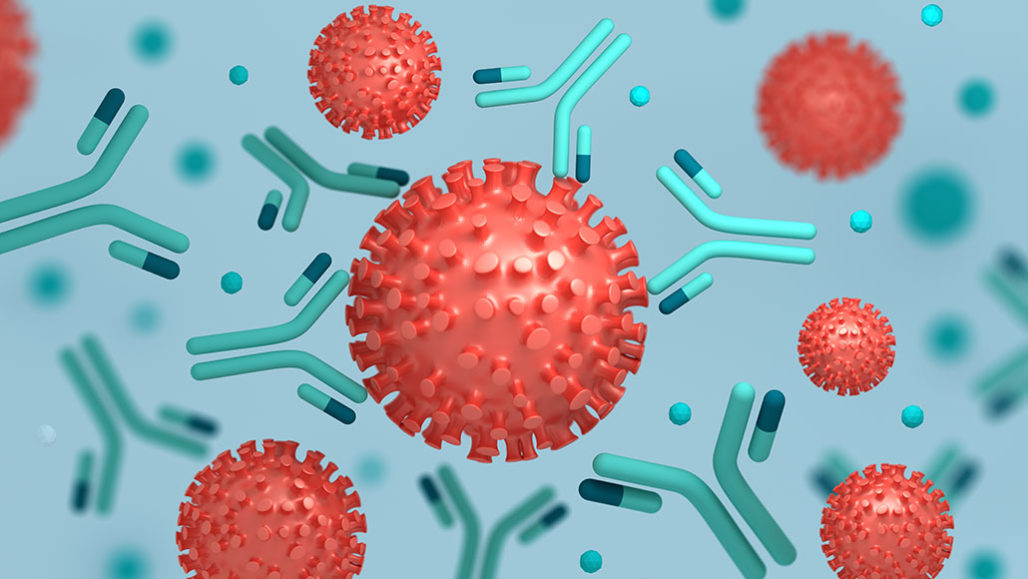Explainer: What are Antibodies?
The body makes this chemical ammo to fight foreign invaders — now and later

An artist’s illustration of antibodies (blue-green structures) attempting to latch onto the antigens on the outer surface of a coronavirus (red). Antibodies are one of the major players in the immune system’s attack against viruses.
DariaRen/iStock/Getty Images Plus
A world of germs is vying to invade your body and make you sick. Luckily, your immune system can assemble a mighty army to protect you. Think of this system as your own personal team of superheroes. They are dedicated to keeping you safe.
And antibodies are among their strongest ammunition. Also called immunoglobulins (Ih-mue-noh-GLOB-you-linz), or Ig’s, these are a family of proteins.
The job of these antibodies is to locate and attack “foreign” proteins — that is, proteins that don’t appear to belong in the body.
These foreign invaders contain substances the body doesn’t recognize. Known as antigens, these can be parts of bacteria, viruses or other microbes. Pollen and other things that cause allergies can have antigens, too. If someone is given blood that doesn’t match their blood type — during surgery, for instance — those blood cells can host antigens.
Antigens attach to the outside of certain white blood cells. These cells are known as B cells (short for B lymphocytes). The antigen’s binding triggers the B cells to divide. This causes them to transform into plasma cells. Plasma cells then secrete millions of antibodies. Those antibodies travel through the body’s blood and lymph systems, hunting for the source of those antigens.
Oveta Fuller is an infectious disease expert at the University of Michigan in Ann Arbor. When an antibody spots an antigen, it latches onto it, Fuller explains. This alerts the immune system to crank out more antibodies to destroy the invading virus, bacteria or other foreign cell.
There are four main types of antibodies. Each has a different job:
- IgM antibodies are made as soon as the immune cells recognize an antigen. They are the first to go to the site of infection and offer some protection. They don’t hang around long, though. Instead, they trigger the body to make a new type: IgG antibodies.
- IgG antibodies “stick around,” says Fuller. “These are the ones that circulate in the blood and continue to fight off the infection.”
- IgA antibodies are found in body fluids, such as sweat, saliva and tears. They grab antigens to stop invaders before they cause illness.
- IgE antibodies are stimulated by antigens or allergens. (Allergens are substances that trigger the immune system to inappropriately go into overdrive. Certain proteins in pollen, peanuts — all sorts of things — can be allergens.) IgE antibodies act quickly. They trigger the immune system to go into what Fuller calls “turbo-charge” mode. These are what make your nose run or your skin itch when you have an allergic reaction.
Memory cells are a special part of the immune system. They make antibodies and remember specific antigens. When activated, they set off a new cycle of antibody production. And they remember how they did it. So once you’ve had something like chicken pox or mumps or measles, you’ll always have some memory cells ready to make more antibodies if they see that infection again.
Vaccines make this process quicker by giving you a weakened version of some virus or bacterium (often part of a germ that lacks the harmful parts). In this way, vaccines help your immune system learn to recognize the invader before you’re exposed to it in a form that can cause disease. Researchers are even treating some people with the antibodies another person had already made to fight off COVID-19. Scientists think this could prevent disease in some people, or perhaps help treat those already sick with the coronavirus that causes COVID-19.
Like all superheroes, immune cells will have to deal with super-villains. And some immune cells might not be up to the task. Certain microbes have tricky ways of fooling antibodies. Shape-shifting viruses, like influenza, change so often the immune system can’t keep up. That’s why scientists have to develop a new flu vaccine each year. But in most cases, your immune system is very good at spotting and destroying germs and other antigen-makers that invade your body and threaten to make you sick.







